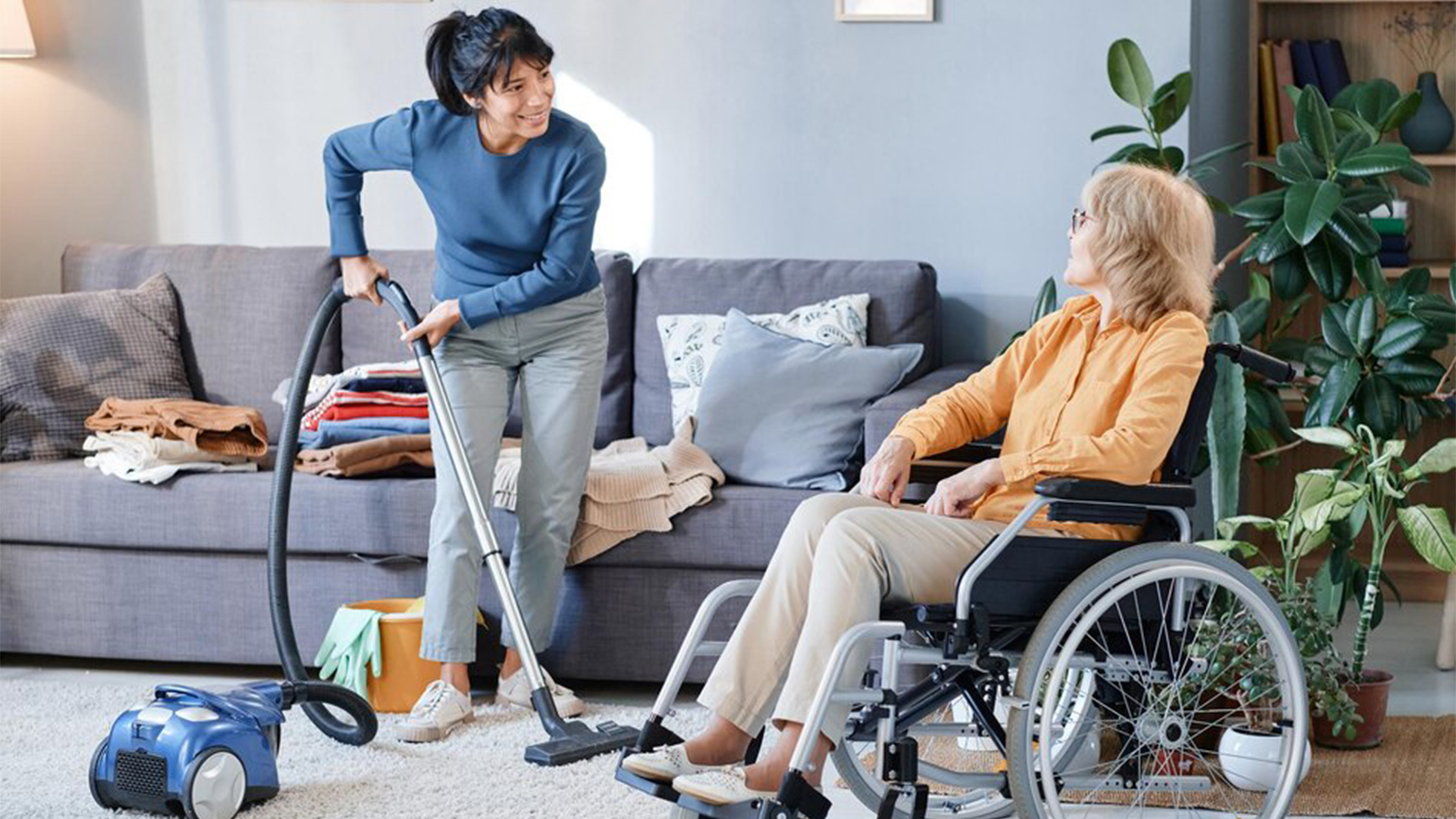How the right support at home provider can ease caregiver burnout
How the right support at home provider can ease caregiver burnout
Blog Article
Why Home Treatment Providers Are Crucial for Comprehensive Disability Solutions and Support
Home treatment service providers play an essential function in supplying extensive impairment solutions and support. They help people with disabilities in everyday living tasks, cultivating freedom and boosting lifestyle. By creating individualized treatment plans, these professionals resolve special demands, making certain reliable interventions. However, their influence extends beyond practical help. Recognizing the complete scope of their payments discloses much deeper implications for area inclusivity and support. What exists below this necessary solution?
Comprehending the Function of Home Treatment Providers
Numerous might assume that home treatment carriers primarily help with standard daily jobs, their function includes a broader spectrum of support customized to people with handicaps. These experts play an important component in enhancing the top quality of life for customers by using help that extends past simple housekeeping or personal health. Home care providers usually promote social communication, helping to deal with sensations of isolation that can accompany handicap. They may likewise assist with medication monitoring, ensuring that individuals comply with their prescribed treatments effectively. Furthermore, home care providers frequently aid in coordinating appointments and transport, advertising access to essential treatment. By promoting self-reliance and offering psychological assistance, they equip people to involve more fully in their communities. This holistic strategy not just addresses physical needs but additionally nurtures psychological and psychological well-being, showing the diverse nature of their considerable duty in special needs services.
Tailored Care Plans for Person Demands
Customized treatment strategies are necessary for attending to the one-of-a-kind demands of people with handicaps, guaranteeing that each client obtains tailored support. Home care carriers work together with clients, households, and healthcare experts to develop these thorough strategies. By reviewing the details difficulties and preferences of each person, providers can determine essential services and interventions that align with their goals.These treatment plans think about various elements, including physical health and wellness, emotional health, and social interactions. They might integrate support with everyday activities, healing solutions, or specialized tools. The participation of caregivers who comprehend the subtleties of each customer's scenario boosts the efficiency of these strategies, promoting an extra encouraging environment.

Enhancing Independence and Lifestyle
Enhancing independence and quality of life for people with handicaps needs a focus on advertising everyday autonomy. Individualized care solutions can empower clients to choose that best suit their one-of-a-kind needs and choices. support at home provider. By promoting this self-reliance, home treatment companies play a necessary function in boosting overall health and satisfaction
Supporting Daily Freedom
Equipping people with impairments to achieve everyday freedom greatly enhances their lifestyle. Home treatment providers play a critical role in this process by urging self-sufficiency and fostering self-reliance. By sustaining activities of day-to-day living, such as individual health, meal prep work, and mobility, caregivers aid clients build confidence in their capabilities. This encouragement not just enhances useful skills yet additionally promotes problem-solving and decision-making capabilities. In addition, by respecting individual choices and selections, home care suppliers cultivate a setting where clients really feel valued and encouraged. The outcome is a significant boost in self-confidence and total health, permitting individuals with impairments to browse their everyday lives with greater simplicity and contentment. Inevitably, advertising day-to-day freedom is crucial for promoting dignity and self-reliance.
Personalized Care Solutions
Customized care remedies are important in meeting the distinct needs of people with handicaps, straight impacting their freedom and lifestyle. These tailored methods think about everyone's choices, capacities, and particular difficulties, making certain that assistance is both appropriate and effective. Home treatment carriers analyze individual conditions, producing customized plans that attend to physical, emotional, and social needs. By cultivating communication and cooperation, caregivers empower customers to actively join their very own treatment, promoting autonomy. This not just boosts their self-esteem yet additionally motivates involvement in everyday tasks. Inevitably, individualized care solutions add to a much more meeting and enriched life for individuals with specials needs, allowing them to flourish within their communities and keep self-respect in their daily experiences.
Connecting the Space Between Medical and Daily Treatment
Linking the space between clinical and daily care is necessary for people with impairments. A coordinated care technique can enhance personalized everyday aid, making sure that customers obtain both clinical support and day-to-day aid customized to their demands. This combination ultimately causes a better top quality of life for those getting home treatment solutions.
Coordinated Care Strategy
A worked with care approach is vital for efficiently integrating clinical services with daily living support for individuals with impairments. This approach fosters collaboration among medical care caregivers, professionals, and households, ensuring that all aspects of a person's care are integrated. By assisting in communication between clinical providers and home treatment personnel, the coordinated approach lessens spaces in service shipment and enhances the general quality of treatment. This harmony enables timely interventions, decreasing hospital readmissions and boosting health and wellness end results. Furthermore, it equips people with handicaps by supplying an alternative support system that attends to both medical needs and day-to-day living difficulties. Eventually, a collaborated care approach is essential for promoting independence and improving the high quality of life for those with handicaps.
Personalized Daily Assistance
Efficient everyday help plays a crucial function in attaching healthcare with the daily needs of people with disabilities. Home care providers tailor their services to meet the distinct requirements of each person, ensuring that personal treatment, meal prep work, and house jobs are managed efficiently (ndis providers). This individualized approach not just facilitates adherence to recommended clinical routines but also empowers people to maintain a degree of independence. Caretakers are educated to identify and resolve certain challenges that clients encounter, linking the gap in between professional consultations and everyday living. By integrating medical knowledge with practical assistance, these service providers boost the general efficiency of treatment, guaranteeing that people get holistic support that encompasses both their health and wellness and everyday living needs
Enhanced Lifestyle
While treatment is necessary for individuals with impairments, it is the integration of daily living assistance that really improves their lifestyle. Home treatment providers bridge the void between clinical interest and day-to-day demands, using tailored aid that advertises freedom. By resolving personal treatment, family jobs, and social engagement, these suppliers create an environment helpful to well-being. This holistic technique not only help in physical health and wellness yet also cultivates psychological security and social connections. When individuals obtain tailored support, they experience increased confidence and improved psychological health, bring about higher life complete satisfaction. Inevitably, home treatment solutions encourage individuals with disabilities to lead meeting lives, making them an indispensable component of comprehensive special needs services and support.
The Importance of Educated Specialists

Structure Strong Relationships With Clients and Families
Developing strong relationships with clients and their families is crucial for enhancing the general top quality of home care solutions. Home treatment providers that prioritize communication and trust cultivate an environment where customers feel risk-free and valued. This connection allows caretakers to much better recognize specific demands and choices, resulting in even more tailored care strategies.Moreover, entailing household participants in the care procedure aids assure that every person is lined up on objectives and expectations. Normal updates and open dialogues produce a sense of collaboration, which can ease concerns and construct confidence in the care being provided.Confident clients and family members are a lot more most likely to engage proactively in the treatment strategy, causing improved health and wellness outcomes. Additionally, solid relationships motivate comments, making it possible for providers to continually adjust and improve their solutions. Eventually, these bonds lay the structure for a supportive, respectful, and reliable home care experience.
Advocating for Rights and Access in the Community
Promoting for the legal rights and access of individuals with disabilities within the neighborhood is crucial for promoting an inclusive environment. Home care carriers play a crucial duty in this advocacy by increasing recognition of the obstacles dealt with by individuals with impairments. They team up with local organizations, federal government firms, and stakeholders like this to promote policy adjustments that improve accessibility to solutions and public spaces.These carriers additionally encourage clients by notifying them of their legal rights and readily available sources, urging self-advocacy. This support not only improves specific lives but also grows a society of inclusivity in the area. By actively engaging in advocacy initiatives, home care carriers help take down stigma and discrimination, making sure that people with handicaps can get involved totally in society.Ultimately, the commitment of home care providers to support for civil liberties and accessibility adds greatly to the advancement of a more helpful and fair area for all.
Regularly Asked Inquiries
What Qualifications Should I Seek in a Home Care copyright?
When evaluating a home treatment supplier, one should consider qualifications such as pertinent accreditations, experience in certain care demands, solid communication skills, history checks, and positive recommendations to assure top quality and security in caregiving.
How Do Home Treatment Providers Differ From Conventional Nursing Care?
Home care services focus on tailored help within clients' homes, fostering independence, while traditional nursing treatment usually involves medical interventions in clinical setups. This difference stresses personalized support versus institutionalized medical treatment for numerous demands.
What Is the Common Cost of Home Treatment Providers?

Just How Can I Find a Respectable Home Treatment Firm?
Locating a reliable home treatment firm involves investigating local options, reviewing reviews, inspecting credentials, and seeking recommendations from medical care experts or close friends. It's essential to talk to possible companies to assure they fulfill specific treatment demands.
What Insurances Typically Cover Home Treatment Solutions?
Insurance policy protection for home treatment solutions commonly consists of Medicare, Medicaid, and exclusive medical insurance plans. Each plan varies, so people should consult their insurance policy company to understand particular advantages and coverage information associated with home treatment services. Furthermore, home treatment companies often help in working with visits and transportation, promoting access to important clinical treatment. By facilitating communication in between medical service providers and home care personnel, the worked with technique minimizes voids in solution distribution and improves the overall quality of care. Home treatment carriers customize their services to meet the distinct needs of each individual, guaranteeing that personal treatment, dish prep work, and house tasks are managed efficiently. Home treatment services concentrate on individualized assistance within customers' homes, promoting independence, while traditional nursing care normally entails medical interventions in scientific setups. The normal price of home care solutions varies extensively, depending on elements such as area, level of treatment required, and period of solution.
Report this page